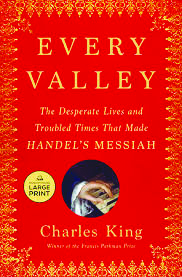Cynthia Erivo and Ariana Grande make for a winning pair in the thoroughly charming Wicked.
As you probably know from the book, the play, the cast album, etc., Wicked offers the backstory of The Wizard of Oz’s Wicked Witch of the West, here called Elphaba (Erivo), the role first played on Broadway by Idina Menzel. After a rough childhood due to her green skin and her father and the townspeople’s horrible treatment of her, a grown Elphaba finds slightly more acceptance at Shiz University, a Hogwarts-y school where her sister Nessarose (Marissa Bode) has enrolled. Their father tells Elphaba to stay to take care of Nessarose, who uses a wheelchair and is perfectly capable of taking care of herself, she tries unsuccessfully to tell people. Elphaba soon finds her own spot there when Madame Morrible (Michelle Yeoh) spots Elphaba’s extraordinary magic abilities. Galinda (Grande), the pink-wardrobe-wearing blonde who was originated by Kristin Chenoweth, accidentally agrees to be Elphaba’s roommate in an attempt to suck up to Morrible. Galinda’s grand ambition is to become a sorceress — and to marry Prince Fiyero (Jonathan Bailey), a super handsome party boy who transfers to Shiz. Elphaba’s plan is to become skilled enough at magic to meet and work with the Wizard of Oz (Jeff Goldblum). She wants to be cheered not feared by her fellow Ozians and if he maybe wants to make her not-green, that would be OK too.
Beneath all these hopes and dreams is a darker political undercurrent. Once upon a time, Oz used to be a place where humans and animals, who could talk, worked and lived side by side. But now there are only two animal professors left at Shiz and Elphaba overhears a kind of animal resistance meeting where they discuss animals who have disappeared and other well-known animal orators who have lost their ability to speak.
That aspect to the story and a later scene where some animals undergo a transformation packs a surprisingly emotional (and dark) punch and maybe makes the movie scarier than your standard PG movie. Odd to say about talking animals but it grounded all the magic and the pink fluff of Galinda in something unexpectedly real. This is fairy tale land, but not a perfect sugary one, which makes for a more nuanced story.
But that is probably not why we’re all here. The movie does right by the music — sure, Grande can feel a little “doing a Kristin Chenoweth” at times, but she creates a fully formed character who can match the heft her songs require. Erivo is likewise absolutely great. If there’s any knock (not really) on her performance, it’s that she is so absolutely stunning at all times that the “ew, she’s green!” stuff is a hard sell. Her “Defying Gravity” is chills-inducing and she is equally at ease with both the intensity and comedy elements of her character. The look of the movie is a delight — a fantastical explosion of color and production design that manages to make Oz look, mostly, like a physical setting rather than just images on a green screen. The costumes are also quite lovely, with wit and thoughtfulness about what they’re trying to convey about the characters. You know, a fun movie that is a joy to watch on a big screen — what a nice holiday treat! B+
Rated PG for some scary action, thematic material and brief suggestive material, according to the MPA on filmratings.com. Directed by Jon M. Chu with a screenplay by Winnie Holzman and Dana Fox, Wicked is two hours and 40 minutes long (worth it for the fun Menzel and Chenoweth cameo) and distributed in theaters (which ask you to please not sing, like, there was a sign and everything; a singalong version will be released on Dec. 25) by Universal Studios.
Gladiator II (R)
Gladiator II Maximus-es so hard, even though the character died in the now-24-year-old original film, that I’m hoping Russell Crowe got royalties.
The movie is set some 16 or so years after the action of the first movie, with Rome still being a corrupt empire and Connie Nielsen, who is now 59 years old in real life, still looking fabulous. We meet simple non-Roman guy Hanno (Paul Mescal) and his wife Arishat (Yuval Gonen), who are just two crazy kids in love, doing chores, but then having to suit up in armor when the “suit up” horn sounds. It seems the Roman navy is nearly at the walls of their city in Numidia. The Romans, led by general Acacius (Pedro Pascal), attack. Arishat is a good archer but Acacius himself calls for her to be killed when she kills one of the Roman soldiers fighting next to him, thus Making It Personal for Hanno, who wants not just revenge against the whole Roman army, which quickly defeats the city, but specific revenge against Acacius.
Hanno is enslaved and sold to Macrinus (Denzel Washington), who sees the spark of a promising gladiator in him. He brings Hanno into his training school, promising him that if he is successful, Macrinus will see that Hanno gets a chance to kill Acacius.
Meanwhile, Acacius returns to Rome and the very petulant club kids who are the twin Emperors Geta (Joseph Quinn) and Caracalla (Fred Hechinger). They tell him to buckle up for their big plans to conquer India and Persia. When Acacius gets home, he sighs to his wife that these doofuses are the worst (paraphrasing). Surprise! — his wife is Lucilla (Nielsen), sister to Joaquin Phoenix’s Commodus in the first movie, who is still trying to be the adult in the room for addled emperors and regain the “dream of Rome.” Never once will you think to yourself “hey, what became of Lucilla’s kid from the first movie” because the movie makes it instantly pretty clear what became of him and retcons some extra action for his character that felt very The Rise of Skywalker (not complimentary).
Lucilla and her dumb plans (has she been playing the long game for 16 years through how many emperors?) and Acacius and the various senators (including one played by Derek Jacobi, the other one of the I think only two actors to return from the first movie) and even Hanno and his revenge are all very small potatoes compared to the big, velvet-covered ham-ery of Denzel Washington. His character is all-singing, all-dancing robes and jewelry awesomeness. At first he’s presented as just another guy on the come-up, trying to take money from the elite of Rome. But then we find out that he has — successfully, way more so than Lucilla — been playing a much longer, somewhat lunatic game. And Washington is eating all of this up with absolute relish, having a total blast whether he’s trying to sell Hanno on the benefits of the gladiator career path or waving around a severed head in front of a horrified senate. Washington doing his Denzel Washington laugh while shmoozing the movers and shakers — chef’s kiss. The movie when he’s not around: a bunch of “thinking about the Roman Empire” mush that doesn’t even keep its logic together with itself, much less actual Roman history. To be clear, I am not looking for accuracy with the timeline here, but I am looking for characters’ motivations to make sense from scene to scene. It’s like in this two-and-a-half-hour meander around the greater Rome metropolitan area the movie itself forgets who is on whose side and why. And through it all, characters — from the gladiators in the coliseum green rooms to Lucilla’s whole personal drama — will not shut up about the long dead Maximus, which helps (along with some lackluster battles and general “I’ve got your echoes in eternity” retreading of story details) to make everything feel like a flatter, duller copy of the first movie. A for Washington, C for everything else, so, like B-?
Rated R for strong bloody violence including one very silly laugh-out-loud moment during the end, according to the MPA on filmratings.com. Directed by Ridley Scott with a screenplay by David Scarpa, Gladiator II is two hours and 30 minutes long and is distributed by Paramount Pictures






